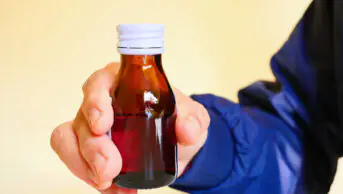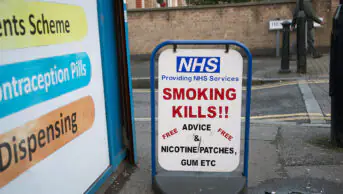
Stephen Barnes/Gluten Free / Alamy Stock Photo
NHS England has identified a number of medicines that should no longer be available on prescription in a move that would save the NHS £128m a year. The drugs have been included in the list because they are deemed to be “ineffective, unnecessary, inappropriate for prescription on the NHS” or because cheaper alternatives can be bought over the counter.
NHS England is working with clinical commissioning leads to develop national guidelines that will set out which products are to be dropped from prescription. The intention is for more products to be added to the list as part of an ongoing government review.
A spokesperson for NHS England says: “The increasing demand for prescriptions for medication that can be bought over the counter at relatively low cost, often for self-limiting or minor conditions, underlines the need for all healthcare professionals to work even closer with patients to ensure the best possible value from NHS resources, while eliminating waste and improving patient outcomes.”
The guidelines will give advice to clinical commissioning groups (CCGs) about which products are being taken off prescription, as well as providing support to prescribers and dispensers, it adds.
The plan to remove low-value drugs from NHS prescription is based on work carried out by NHS Clinical Commissioners (NHSCC) — the national group representing CCGs in England.
NHSCC identified potential savings of £400m a year by removing products that fall into four categories: low clinical value; cheaper alternatives available; clinically effective but ‘low priority’ and products prescribed on the NHS that can be bought over the counter (see ‘Medicines and products identified as ‘low priority’ for NHS prescribing’).
More details about the move are due to be revealed on 31 March 2017 when NHS England publishes its delivery plan for the ‘Five year forward view’, which sets out its reforms for the health service up until 2020.
Graham Jackson, co-chair of NHSCC, says: “We need to be honest with the population — the NHS can and does provide high quality, cost-effective care, but our ability to continue to do so will be restricted if we can’t prioritise those areas which will get the best outcomes for patients, while getting the best value for our limited NHS budget.
“The medicines spend is one where there is huge potential to unlock resources and redirect them to those higher priority areas like mental health and primary care. Through doing this we can deliver better outcomes for patients. The principles of this work will also support the much needed long-term transformation of the NHS.”
He says NHSCC had identified “an initial £128m worth of products to kick off those discussions with the aim of agreeing that CCGs can begin to reduce their spending on these at a national level. We know that CCGs are keen to explore other products that promote the self-care agenda and where there are even more significant sums of money that could be released and used more effectively and efficiently for our patients and local populations”.
These products include antihistamines, sun creams, cough and cold remedies, heartburn and indigestion products.
Julie Wood, chief executive of NHS Clinical Commissioners, adds: “This is not about cutting essential services or restricting access for patients to services they need, it is about allowing local clinical leaders to make the best and most efficient use of the money CCGs have available to spend in really challenging circumstances.”
The Royal Pharmaceutical Society (RPS) and the Royal College of General Practitioners (RCGP), however, have expressed some concerns about the move.

Source: MAG/The Pharmaceutical Journal
Sandra Gidley, chair of the Royal Pharmaceutical Society English Pharmacy Board, is concerned about a blanket ban on products used to treat life-long conditions such as coeliac disease and chronic pain
Sandra Gidley, chair of the RPS English Pharmacy Board, says: “The NHS has traditionally provided treatment free at the point of use for both short-term and life-long conditions. Today’s announcement could be interpreted as an attack on this important principle. Balanced against this is the need for the NHS to be as cost effective as possible in a time of constrained resources. We understand the need for prioritisation.”
Gidley agrees that products with “low or no clinical evidence of effectiveness” should be urgently reviewed, but says she is surprised that “homeopathy, which has no scientific evidence of effectiveness is not on the list for review”.
She adds: “We are concerned at how a blanket ban of products to treat life-long conditions such as coeliac disease and chronic pain could have unintended consequences on those who rely on these treatments to improve the quality of life. For those on low incomes, ability to pay for products and medicines can be a significant barrier to accessing treatment.”
Similar reservations were expressed by Helen Stokes-Lampard, chair of the RCGP: “Imposing blanket policies on GPs that don’t take into account demographic differences across the country, or allow flexibility for a patient’s individual circumstances, risks alienating the most vulnerable in society — and we will be seeking assurances from NHS England that this won’t be the case.”
Box: Medicines and products identified as ‘low priority’ for NHS prescribing
Products with low clinical effectiveness or lack of evidence (total annual spend: £37.98m)
- Co-proxamol (£8.32m)
- Omega-3 and fish oils (£5.65m)
- Lidocaine plasters (£17.58m)
- Rubefacients (£6.43m)
Clinically effective products with a more cost-effective alternative (total annual spend: £58.69m)
- Liothyronine (£30.93m)
- Tadalafil (£10.51m)
- Doxazosin MR (£7.12m)
- Fentanyl (£10.13m)
Clinically effective products that are deemed low priority (total annual spend: £31.35m)
- Some gluten-free foods (£21.88m)
- Non-NHS funded travel vaccines (£9.47m)


